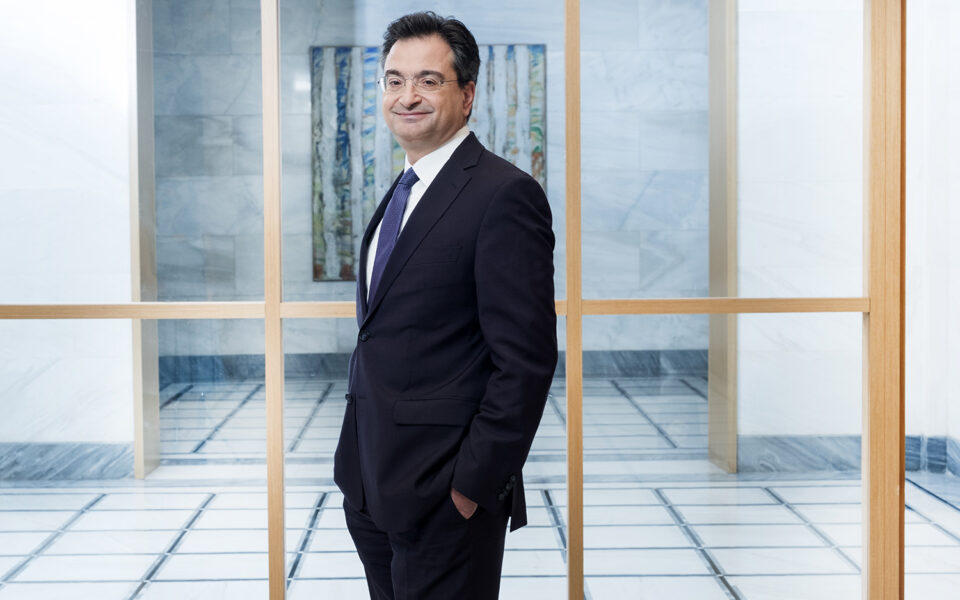‘Sustainable and inclusive prosperity’
Banks must support a novel kind of growth, Eurobank CEO tells Kathimerini

“Banks have a crucial role to play toward supporting a novel kind of growth, environmentally sustainable and socially inclusive. Not just growth. Prosperity. Sustainable and inclusive prosperity.” That is how Fokion Karavias, Eurobank’s chief executive officer, views the role of banks in today’s world, as he explains in this interview with Kathimerini. He stresses that achieving high growth rates for a five-year period should be a major goal for Greece. Another major goal should be regaining investment grade, as soon as possible, as the abundant liquidity provided by the European Central Bank will not be available forever. He also underscores that fiscal discipline must be a priority for the country and a fundamental obligation to future generations. He also says that bar companies that have proven to be consistently loss-making or have overdue debt, no request for funding is rejected.
You have said that regaining investment grade should be a major goal for the country in the coming period. Why?
Greece has three major goals: achieving a long period of constant growth with annual average rates of 3.5-4% per year until at least 2026. But it is not unqualified growth that we are looking for. We need a different model of investment – driven growth, the kind that can contribute toward making up for the investment gap of around €100 billion created by the Greek crisis. Regaining investment grade should be an immediate goal. Greece borrows at low cost from the markets due to the abundant liquidity secured by the European Central Bank’s policies and particularly due to its pandemic emergency purchase program (PEPP). However, this will not always be the case. In an environment of decreasing liquidity, countries with low credit ratings are more exposed. Certainly, this is something that we all wish to avoid. We cannot forever remain the only Eurozone country with its sovereign bonds in junk category.
How will regaining investment grade affect Greek banks in particular?
Investment grade will attract a number of investors to Greece, as entire categories of funds today cannot invest in the country due to their own specifications and regulatory restrictions in their investing standards. Investment grade will therefore support the market valuations of all companies, first of all those borrowing through eurobonds. This applies strongly to banks that have large debt issuance programs in view of our supervisory obligation to tap the markets for capital. Overall, regaining investment grade implies lower borrowing costs for the Greek economy.
What kind of narrative could support the case for regaining investment grade when we talk about a country with a debt-to-GDP ratio of 200%?
The public debt is large, there’s no question about that. The Greek debt though has special features and we need to highlight them: It is mostly owed to other European sovereigns. It has an extended, average maturation period and low servicing costs, both in absolute terms and compared to other eurozone countries. Additionally, Greece has a high cash buffer of around €40 billion, the largest worldwide in terms of GDP (20% of GDP).
At the same time, two crucial steps have been taken: First, apart from the pandemic period, Greece has managed to achieve fiscal balance. It is essential not to relapse into the twin deficit situation that led into the Greek debt crisis some years ago. Secondly, the cleanup of balance sheets in the banking sector. Eurobank is the bank that paved the way. Our single-digit nonperforming exposures (NPE) ratio, announced a few days ago, is not simply a number or a technical accounting detail. Achieving an NPE ratio of 7.3% is a turning point for Eurobank but also for the Greek banking system, which follows our steps, targeting similar numbers at the end of 2022. I would dare say that this is Eurobank’s distinct contribution to the collective effort for Greece to regain investment grade. We managed to get to this point because Greek banks followed guidance provided by Bank of Greece and the ECB and drew up credible, long-term, plans for their NPE reduction. Mirroring this path, the public sector could focus more on the medium-term dimension of the public debt’s reduction plan, highlighting an effective combination of dynamic GDP growth and sensible primary surpluses.
Do you think that Greece will continue, as an exception, to benefit from the liquidity provided by the ECB?
We are waiting for the ECB’s decisions in the following days on this matter. We are the only country in the eurozone facing this uncertainty, precisely because we do not have investment grade. Much will depend on the pandemic’s course. In any case, though, optimism is justifiable, taking also into consideration relevant statements by the governor of the Bank of Greece.
Would you say that Greece faces the risk of extreme targets for primary surpluses from 2023 onward? How can we avoid this?
Target-setting will be discussed and negotiated in relation with the general context. We cannot set the bar on our own but we can anticipate the European Union shifting from rigid, absolute commitment to fiscal austerity as the sole criterion. On our part, we must never forget lessons learnt from the crisis and all that followed. Fiscal discipline is now our own priority, one with features of intergenerational and social justice. We have come to know that, in the end, someone has to pay inevitably for the deficit, and it is mainly the weaker and the younger who inherit it.
What are your predictions on Greece’s growth?
This year’s recovery is impressive, above 7%, despite problems regarding international supply chains. Without a negative surprise on the pandemic front, we will have a high growth rate of around 5% next year as well. What is important is to outperform average eurozone growth rates for many years. The prerequisites are there – availability of funds, ongoing reform and a positive economic climate both in terms of investment and on the consumer side. There are major developments that are not yet visible to their full extent. For example, we are seeing the silent regeneration of Greek industry. Industrial production is already above 2019 levels. We can see tech-intensive sectors of high added value becoming internationally competitive and able to attract investment, such as the pharmaceutical industry or data storing centers. We see many companies planning investment and acquisitions aiming to increase their size and enhance their extroversion. We see global brands like Pfizer, Microsoft or Amazon setting up research hubs or strategic infrastructure in Greece. Even tourism is developing new features, upgrading the quality of service, shifting to sustainability and the environment not only as a new form of operation but also as a new customer experience. Banks have a crucial role to play toward supporting a novel kind of growth, environmentally sustainable and socially inclusive. Not just growth. Prosperity. Sustainable and inclusive prosperity. All of Eurobank’s efforts converge toward this goal.
The pandemic has severely affected tourism but it has also highlighted the need for a new model. In what ways can you support the sector in this direction?
As soon as the pandemic broke out, Eurobank announced a freeze on the repayment of loan principal for the hotel sector, which was most severely affected by the crisis. The sector is the engine of the Greek economy and many companies eventually managed on their own. We froze installments to the tune of €200 million. Now that increased appetite for Greek destinations is raising the need for additional investment, we have announced a new funding program of €750 million. Around €500 million of that is intended to support investment for the construction of new hotel units and the expansion or renovation of those in the four- and five-star categories. We are also initiating two new programs on environmental, social and corporate governance (ESG) criteria. We provide these programs at preferential pricing terms, for those who decide to invest in tourism with specific environmental standards and sustainability criteria. Therefore not only do we provide financing but we are doing everything in our power to motivate companies, not only in tourism, to take the step and invest in the future. For our part, we are making sure that they have access to the necessary funds.
Eurobank made a strategic choice and maintained its presence in certain markets abroad. What comes next?
Our international presence is a strategic choice indeed. It is part of Eurobank’s DNA. It was not obvious that we would eventually manage to maintain this footprint. Now, this is something that differentiates us from our peers in the Greek market, giving us a competitive advantage and differentiated sources of revenue. The consistent contribution of our international activities to our profitability as well as the market trends prove the choice we made was the right one. We have one of the four largest banks in Bulgaria, where a bank of similar size was recently bought at a price pointing to pre-crisis valuations. If the same transaction fundamentals were to be applied to our subsidiary, its value would amount to around 40% of the group’s current valuation. Our international scope is a strength for our bank and can be useful for the country as well.
The resources of the Recovery and Resilience Fund (RRF) have created great expectations. However, there is the perception that these funds will be directed mainly to large companies, leaving out the vast majority of small businesses. Is that true?
The RRF is extremely important, but it is a mistake to consider it the only available funding tool. Its resources are allocated to loans, an area where larger and medium-sized companies are better placed to present eligible plans, and to subsidies which by design will be spread throughout the economy. In addition, smaller companies and professionals have many other options and alternatives, without being excluded from the RRF. These alternatives are specifically designed for their needs, such as the new Development Law, the new European Union Partnership Agreement for the Development Framework 2021-27 (known in Greece as ESPA) funding, the Hellenic Development Bank’s programs and European programs in cooperation with the Hellenic Development Bank and the European Investment Fund. No company or professional with a viable business plan will be left short of funding.
Lately, banks have been facing intense criticism for excluding the majority of Greek companies from getting a loan. Is this fair criticism?
I am looking for companies to lend money to day and night. Please, do indicate to me companies that wish to borrow for working capital or for implementing a plan, as long as they are not systematically loss-making and do not already have overdue debt or excessively high liabilities. We will do our best to finance them as soon as possible, because this is our main job and our main source of revenue. Not only do we not reject reasonable requests, but we are rather facing tough competition, as evidenced by the downward trend in loan pricing.
Despite the reduction of nonperforming loans, there are still legacy issues, such as the large share of deferred tax in the banks’ capital. Is it still early for a dividend distribution?
Resuming dividend distributions presupposes an institutional dialogue with our supervisory authorities. As we are the first bank with fundamentals allowing that move, we intend to launch this dialogue in the near future. In that context, all points of concern will be discussed. However, I wish to emphasize two points: It’s not just that the bank is profitable this year, but we will also have a double-digit return on equity each year in our three-year plan. Therefore we will be creating significant organic capital. Secondly – a note of broader importance – dividend distribution is the normal operation of any company, especially a listed one. As long as no dividend is distributed, no one will be convinced, and rightly so, that the country’s banking sector and the economy are operating normally. Dividends equal a return to normalcy.
What differentiates banks in their competition with fintech companies? How is Eurobank adapting to digitization?
In the face of that great future challenge the digital age represents, each organization and bank are called to make strategic choices. At Eurobank we recently presented our new logo. However, the change is not simply one of aesthetics. It reflects a break with past problems, on the one hand, and the future path we have taken, on the other. We will not become a digital bank. We believe in direct, face-to-face contact with our customers. Trust is the basis of this relationship and we do not consider that one can build trust with a chatbot. However, we will make the most of technology, artificial intelligence and state-of-the-art information systems to equip our people and make life easier for both employees and customers. We call this model phygital, as it is both physical and digital. To put it simply: Machines can perform transactions and repetitive tasks, but only humans can create the banking relationship.
What is your strategy regarding the real estate assets on your balance sheet?
A major advantage, one that sets us apart from our peers in the local market, is that we have differentiated revenue sources. Our revenue comes from banking operations in Greece, from our international activities, and also through a significant real estate portfolio that we are going to maintain on our balance sheet. Our assessment is that the increase in property prices in Greece is happening rapidly, but reasonably given the large decline recorded previously. My personal estimation is that there is still room ahead. Comparing to some countries, there doesn’t seem to be a in real estate bubble in Greece.





